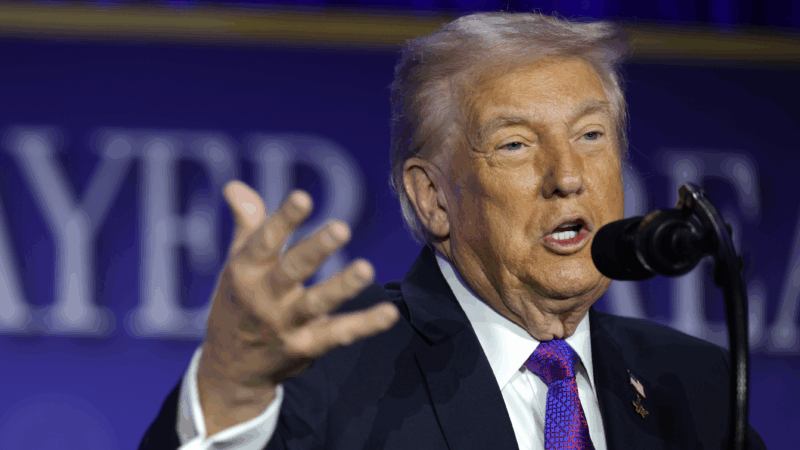Former Birmingham Mayor Larry Langford, 72, Dies
One of Birmingham’s most colorful and memorable mayors died Tuesday. Larry Langford, 72 died this evening at a Birmingham hospital. He battled a multitude of health issues, and a federal judge recently reduced his 15-year prison sentence on corruption charges. Before his return to Birmingham late last month, he was in a federal prison in Lexington, Ky.
Langford, a former Jefferson County commissioner, had a long political career around Birmingham. He led Alabama’s largest city for two years before being convicted on federal corruption charges in 2009.
Jerry Levin remembers when he first met Larry Langford. It was the mid-1970s. Levin was starting as the News Director at WBRC-TV in Birmingham. Langford was a reporter. But it was Levin’s the second day on the job that sticks out.
“That’s when Larry came to me, and said I’d like to have a private talk with you,” Levin agreed, and they sat down. “And he looked me right in the eye and he said you know, I should have been news director.”
Levin says he has no idea if Langford actually applied for the job. It did not prevent them from working well together. But that audacity, that self-assurance, those traits would mark Langford throughout his career.
Larry Langford grew up in a Birmingham housing project and told stories of being raised by a mother who demanded discipline. After a stint in the Air Force, he became one of the first black television reporters in the city. A charismatic, intense presence on air, he left television for politics after winning a seat on the Birmingham City Council in 1977. He ran for mayor two years later, campaigning with his typical flare.
“We’ve spent $5 million to expand the present museum. We built the Red Mountain Museum. We got the children’s museum. We’re gonna build an airport museum. They wanna build a Sloss museum. At the rate things are going in this city we’re gonna become the most culturally enlightened, unemployed group of folks you ever laid eyes on,” he said.
Langford did not win that race in 1979. But he later found political success in Fairfield. In 1988, he became mayor of that city. He was re-elected three times. He then won a seat on the Jefferson County Commission in 2002. Five years later, he emerged from a crowded field to become Birmingham mayor. With stylish suits and a quick sound bite, Langford pushed new ideas and new projects everywhere he went.
“He is a master at talking people into things. You know, I say he could sell ice to eskimos and he could,” Birmingham City Councilwoman Valerie Abbott says.
Abbott heard many of those proposals. Free life insurance for parents of schoolchildren. European style fountains and plazas. Bidding for the 2020 Olympic games. Some ideas drew strong criticism, but former Alabama State Representative Chriss Doss says Langford had a knack for taking on the drama and coming across as a champion.
“I don’t think I ever recall a situation where he didn’t have a pretty good answer for whatever it was he was being interview about,” he says.
Some ideas did happen, such as renaming Birmingham’s airport for civil rights icon Fred Shuttlesworth. Others ended up in a muddle. While mayor of Fairfield, Langford convinced almost a dozen cities to back an amusement park then known as Visionland. He led the almost $100 million project only to have it sold out of bankruptcy a few years later.
There is no shortage of stories about Larry Langford – his gambling habit, his temper, his unrepentant attitude in the face of critics. Langford pushed back against accusations he did not meet residency requirements to be Birmingham mayor and that he still lived in Fairfield, not in the downtown loft he leased just months before the election. The issue spawned a lawsuit from a mayoral opponent, which Langford told WBHM in 2007 was based on faulty reasoning.
“He said they didn’t see my car parked in front of the building. We’ll just because you don’t see me car doesn’t mean I’m not there,” Langford said.
A judge dismissed the case and Langford’s opponent dropped the appeal.
As Langford charged ahead, the Securities and Exchange Commission followed. Several former Jefferson County Commissioners were suspected of corruption around bond deals financing repairs on the county sewer system in the mid-2000s. With rumors of criminal charges swirling, Langford insisted in a 2008 WBHM interview, it was a political prosecution.
“Let me say this to you. This is America. You can indict a ham sandwich in this country. If you take off the lettuce and tomato, anything can go to jail,” Langford said.
The federal government did indict Langford and two others alleging a pay-for-play scheme. Prosecutors said Langford accepted $235,000 in designer clothes, jewelry and cash from a lobbyist. In exchange, Langford steered millions of dollars in sewer bond deals to an investment banker – deals which contributed to Jefferson County’s massive bankruptcy. While the other two pleaded guilty, Langford maintained his innocence saying he simply received gifts from longtime friends.
But in 2009, a jury disagreed. Jurors deliberated less than two hours before convicting Langford. Outside the courthouse after the verdict, Langford expressed surprise but was defiant as ever.
“I’m not the first person who’s ever gone on trial for something that they didn’t do. It happens,” Langford said. “But if you expect to see me crying and the head dropped, you picked the wrong one. I’m not it.”
“He was the most, probably the most dynamic public official I have ever been around,” says Eddie Lard, a former editorial writer for The Birmingham News. He says while Langford was liberal on taxes and spending, his social conservatism appealed to suburban, whiter communities.
“He would talk about personal responsibility. The need for good parenting,” Lard says. “And as he said sometimes the need for the parents to whoop their kids to keep them in line.”
Langford was not shy about mixing religion and politics, holding a Bible study in the mayor’s office and peppering his speeches with Bible verses. Those public presentations led to national news coverage in The New York Times and on NPR, such as a “Day of Prayer” to combat crime. More than a thousand people packed a city auditorium. They donned sackcloth to show humility before God. Pastors dumped ashes on a makeshift altar. A shofar blew as Langford approached a podium bearing the city seal.
Alabama Media Group columnist John Archibald says Langford continued to preach and teach while serving a 15-year prison sentence.
“His biggest worry throughout was his inability to eat because he was always picky about that and he lived off of junk food and soda and cigarettes,” he says.
Archibald says Langford seemed unable to see the hypocrisy of demanding personal responsibility while blaming others for project failures and his conviction. While in prison, Langford believed others in Birmingham were taking credit for ideas he championed as mayor. Archibald says there is something to that, but it is not enough to have the idea. You have to see it through.
“He could have been the best mayor this city’s ever had, and that’s the big disappointment because he was also the mayor this city had that most belonged in jail,” he said.
It’s with a heavy heart that I announce the passing of Mayor Larry Langford. Our hearts go out to the Langford family during this time of loss. pic.twitter.com/pmUSeoU5nH
— Randall Woodfin (@randallwoodfin) January 9, 2019
Birmingham has been dubbed the city of perpetual promise – that the city never quite reached its potential. Larry Langford seems a similar tale of potential lost.
Photo by Andre Natta
In Berlin, there are movies, there’s politics and there’s talk about it all
Buzz around whether the city's film festival would take a stance on the war in Gaza has dominated conversation in recent days.
Alex Ferreira wins 10th gold medal for Team USA, matching America’s highest total in Winter Olympics
Freeskier Alex Ferreira clinches a tenth gold medal for the U.S. in these Games, tying the U.S.'s all-time record for gold medals in a Winter Olympics.
Trump calls SCOTUS tariffs decision ‘deeply disappointing’ and lays out path forward
President Trump claimed the justices opposing his position were acting because of partisanship, though three of those ruling against his tariffs were appointed by Republican presidents.
The U.S. men’s hockey team to face Slovakia for a spot in an Olympic gold medal match
After an overtime nailbiter in the quarterfinals, the Americans return to the ice Friday in Milan to face the upstart Slovakia for a chance to play Canada in Sunday's Olympic gold medal game.
NASA eyes March 6 to launch 4 astronauts to the moon on Artemis II mission
The four astronauts heading to the moon for the lunar fly-by are the first humans to venture there since 1972. The ten-day mission will travel more than 600,000 miles.
Skis? Check. Poles? Check. Knitting needles? Naturally
A number of Olympic athletes have turned to knitting during the heat of the Games, including Ben Ogden, who this week became the most decorated American male Olympic cross-country skier.







